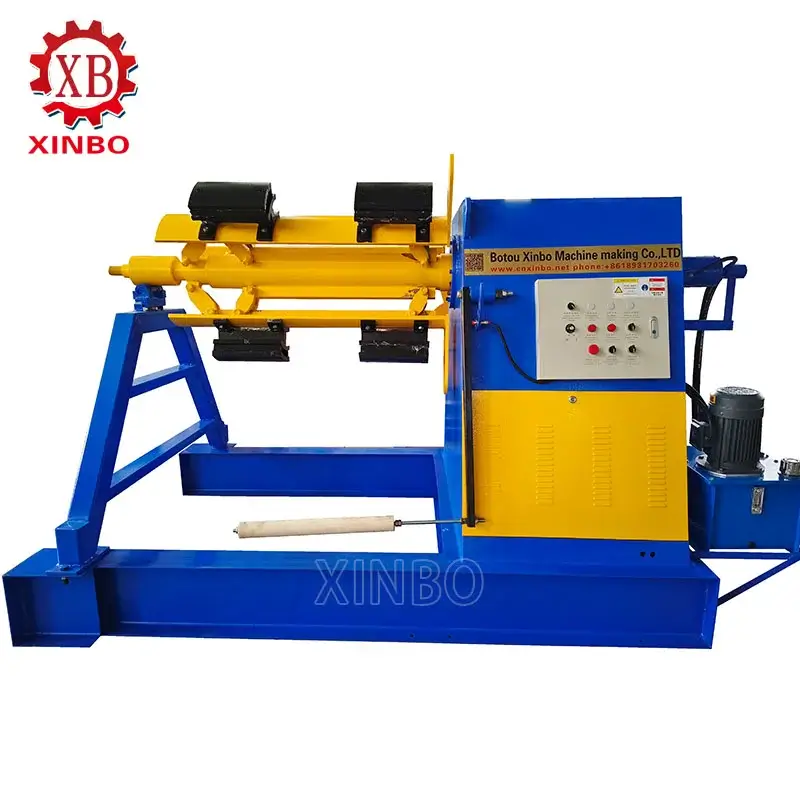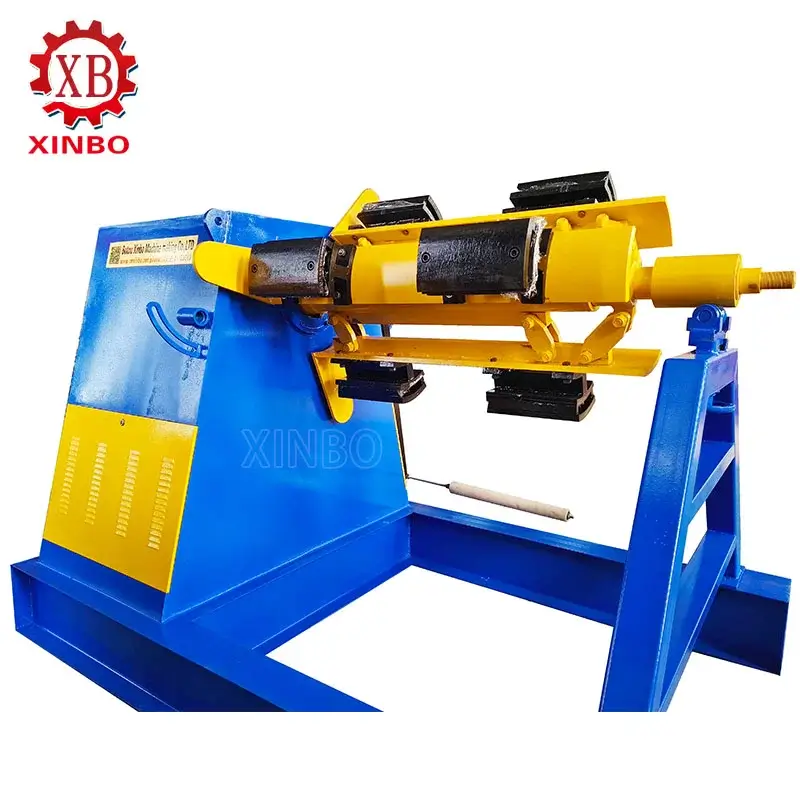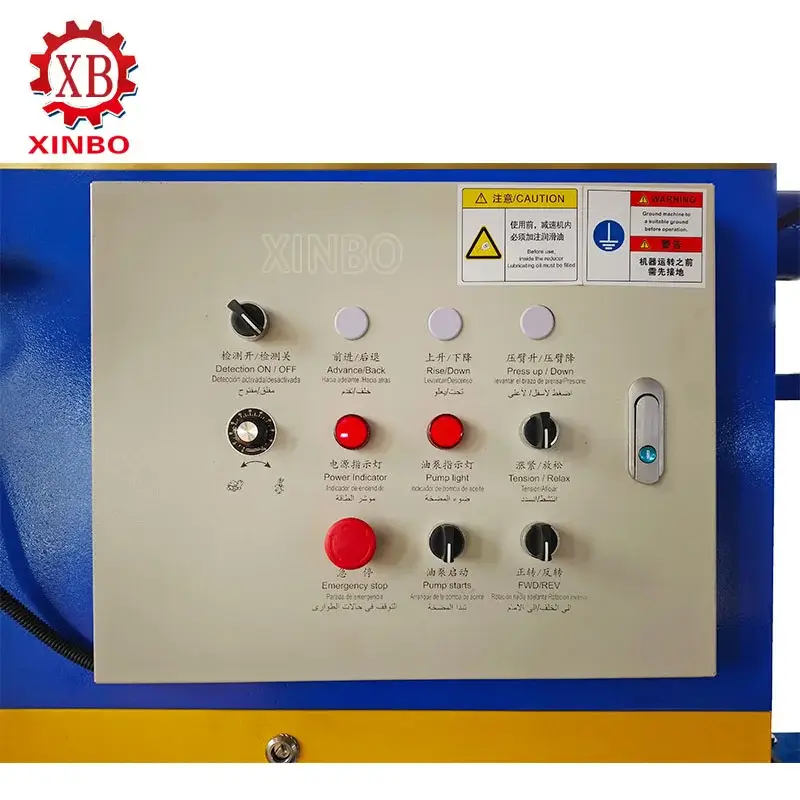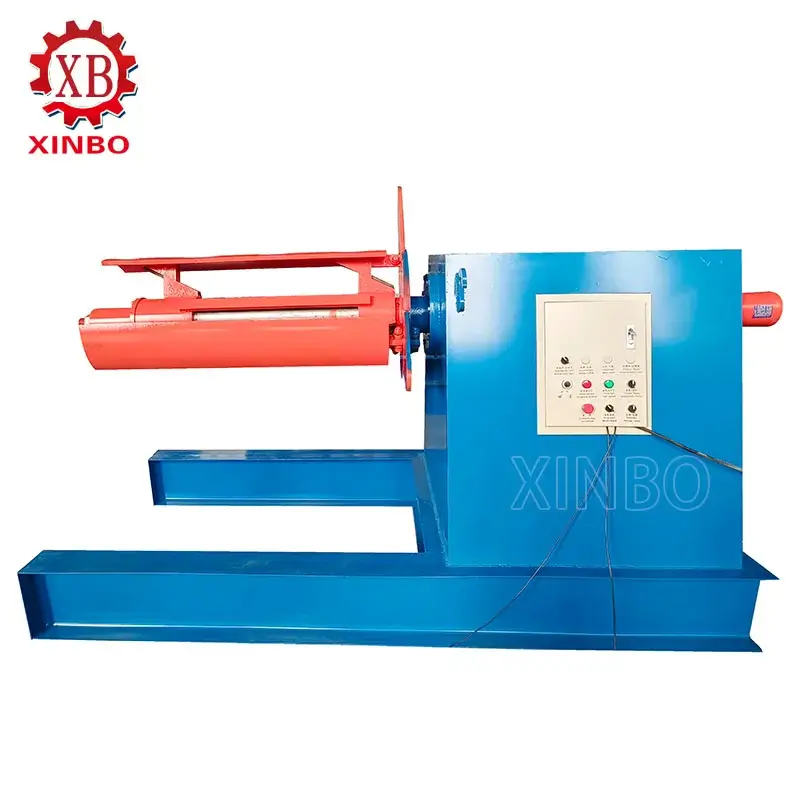Good quality
XinBo machine making CO. LTD is a professional manufacturer and exporter in roll forming machine,
VIEW MORE→In the fast-paced world of metal processing and fabrication, efficiency is key. The unsung hero behind the process is the hydraulic decoiler machine, a powerful tool that ensures smooth unwinding and feeding of the coils into the production lines. Be it steel, aluminum, or copper, a hydraulic decoiler machine allows for smoother operations, increased productivity, and minimal risk compared to manual handling.

Below, in the blog, we go deep into details on the technical aspect of the hydraulic decoiler machines and their key features, tell about their benefits, and teach you how to select an ideal model for your enterprise.
A hydraulic decoiler machine, also known as hydraulic uncoiling, is a state-of-the-art machine that plays a very important role in uncoiling and feeding the metals into the production line with control and precision. Unlike manual decoilers, which rely upon human labor, hydraulic decoilers use hydraulic power, by which the process will go smoothly and constantly, thus producing more with less risk of injury.
These machines form part of modern metal processing and are employed in uncoiling materials to their subsequent use in operations like cutting, bending, or forming.
The hydraulic decoiler machine has a few major components that work together in such a concerted manner as to ensure the process of unwinding of the coil remains effective with lots of precision.
Decoiling Mandrel: The main unit, which holds the metal coil and rotates to unwind the material.
Hydraulic Expansion System: A system that secures the coil onto the mandrel by applying force to the inner diameter of the coil so that it would not slip or misalign during the process of unwinding.
Tension Control System: The system ensures the continuous feeding of material at the right tension so as not to damage the coil.
Motor and Transmission: These are responsible for the power input required in rotating the decoiling mandrel, hence facilitating easy unwinding of the metal coil.
Each of these parts is made to be strong for the machine to work perfectly under heavy-duty conditions.

Hydraulic decoiler machines exist in several configurations to suit various needs in production. The main three types include:
Investing in a hydraulic decoiler machine can go a long way in improving the efficiency of your metal processing operations. Here are the key benefits:
Higher Productivity: Hydraulic decoilers help automate the process of unwinding the material, thus saving lots of time and manpower. Throughputs become larger, with bottlenecks in the line less frequent.
Precision in Coil Control: These machines allow much better regulation in terms of speed and tension while unwinding. There is minimal damage to the materials, and they can assure uniform feed during the operation process.
Safety Enhanced: Most hydraulic decoilers have been fitted with various inbuilt safety features that include overload protection, emergency stop buttons, and automatic shutoff. This helps a lot in minimizing accidents at workplaces.
Diversity: Hydraulic decoilers can process a great variation of materials, coil widths, and weights; their fields of application, therefore, stretch over a wide compass, from the automotive, through sheet metal processing to construction.
Space Optimization: Compact footprint, further aided by flexible mounting, assures that hydraulic decoilers will make the most of your available space without compromising any operational efficiency.
Minimal Material Waste: Fine control with hydraulic decoilers reduces waste to the minimum and ensures that coils are processed to utilize the maximum amount of material.
Easy and Fast Coil Changeovers: Hydraulic decoilers offer easier changeovers from one size and type of coil to another. Such a feature minimizes down times during changeovers and boosts overall productivity.
Remote Control and Automation: Most modern hydraulic decoilers feature remote control to the operators for making setting changes and can easily be integrated into automated production lines.

Long Life and Durability: Being manufactured from quality components, hydraulic decoilers have long service lives and are capable of withstanding high-duty cycles without compromising their performance.
Cost-Effective: While the initial investment might be very high, the gain through productivity, reduction of wastage, and labor costs ensures that hydraulic decoiling will be really worth huge expenses in regard to offering solid and effective investments in the long run.
Hydraulic decoiling machines find quite a wide range of usage in manifold industries, some of which include:
Treatment of Sheet Metal: In treating metal sheets, hydraulic decoilers work in the operation of cutting, bending, and shaping them into continuous feeding for further processing with machines.
Building and Infrastructure: In building industries, hydraulic decoilers are important in the supply of metal sheets used for roofing, cladding, and structural parts.
Automotive Industry: These machines are indispensable in the manufacture of automobiles, providing accurate metal sheets for body panels, chassis components, and other important parts.
Manufacturing Appliances: From home appliances to electronic components, hydraulic decoilers help smoothen the production lines by providing a constant feed of metal coils for shaping and assembly.

Some of the things one should look at when selecting a perfect hydraulic decoiler for his or her business include:
Material Compatibility: It shall be able to work with the material to be processed, be it steel, aluminum, or copper.
Maximum Load Capacity: It shall be able to bear the weight and size of the coils one will be dealing with.
Ease of Operation and Maintenance: Choose the machine that is easy to operate, for example, intuitive controls, easy coil changeover procedures, and maintenance points easily accessible.
Within Budget and Feature Requirements: Prioritize the features required, such as automation or remote control, and choose the machine that fits your budget and meets the production requirements.
From simple manual operation to more durable and reliable hydraulic decoiler machines, Xinbo solutions are available. Xinbo has been in business for over a decade since its emergence in the industry of metal shaping and roll forming, providing a wide range of hydraulic decoiler machines with advanced precision, speed, and durability. Their machinery is designed under strict control and passes international standards, including UL, TUV, CE, CQC, ROHS, REACH, quality and reliable.
-Processing Material: PPGI, GI, Zinc, Aluminium coils
-MaterialWidth:914mm/925mm/1000mm/1220mm/1250mm/1300mm (Customizable)
-Processing Thickness: Standard: 0.3—0.8mm (Customizable)
-Inner Diameter: Customized to 710mm
-Frame Style: 400mm H steel welded
-Production Speed: Standard: 25m/min (Customizable)
-Roller Driven: Decelerating Motor + China Transmission
-Control Style: PLC-based, Button + Touch Screen Operation
-Total Power: 4KW (Customizable)
-Voltage: 380V, 50Hz, 3-phase (or customized)
Xinbo also offers both OEM and ODM services, wherein customers can have designs made to order for their particular operational needs. Be it a standard model or a customized solution, one can avail it from Xinbo.
The hydraulic decoiling machines produced by Xinbo reflect the peak of efficiency and robustness. The quality commitment, competitive pricing, and customized solution provided by the company make them a leading company for any business seeking to upgrade its processing of metals.
If you’re ready to take your production to the next level and take coil handling to new heights, Xinbo is the partner you need. Feel free to contact Xinbo today to discuss your needs and learn how their hydraulic decoiler solutions can take your business to the next level.
Phone: +86 18713731132
Email: serena@cnXinbo.net
WhatsApp: +86 18713731132
More information about the complete range of machines offered by Xinbo can be found on their website: advanced roll-forming machines, embossing machines, and many others.

XinBo machine making CO. LTD is a professional manufacturer and exporter in roll forming machine,
VIEW MORE→

